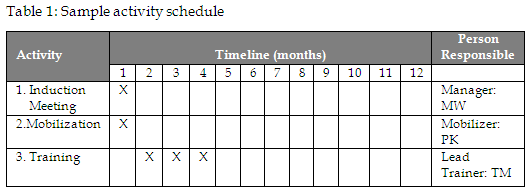Introduction
Planning is one of the most important project management and time management techniques. It is a rational determination of how to initiate, sustain, and terminate a project. In essence, failure to plan, is planning to fail. Project planning involves defining clear project goal and objectives, outlining project output, generating project activities and allocating resources appropriately to inform successful project implementation process. It is at this phase of planning that human, material and financial resources are organized in a better way to undertake given activities within constraints of time and cost so as to achieve some intended project objectives. Figure 2 shows project planning flowchart.
Figure 2: Project planning flowchart
Project Planning Parameters Explained
Goal
This is the general objective of the project. The goal specifies the benefits, which the beneficiaries will enjoy as a result of the project.
Objectives
- A project objective is the situation that is expected to be present at the end of the project.
- Objectives SHOULD be SMART (Specific, Measurable, Achievable, Realistic and Time-bound) in order to contribute to achieving the longer-term aims. Objectives form the basis for the activities of a project and also serve as the basis for project evaluation (Gosling, 2000).
For an objective to be good, it should be SMART, meaning it should be:
- Specific (what is expected to change and in what way, where and for whom).
- Measurable or monitorable (not necessarily using figures, but so that you can demonstrate that change has taken place).
- Achievable (agreed between stakeholders, although different stakeholders may agree to have different objectives).
- Relevant (to all stakeholders and the real problems and local realities) or Realistic (given real problems, available resources and local realities).
- Time-bound (should indicate the time frame). Objectives may need to be changed as a result of changing circumstances or a change in understanding of the situation.
Outputs
These are tangible, measurable results expected to be realized after successful completion of a project. All project activities are performed under certain requirements in order to develop a desired measurable output (Task Management Guide, 2020).
Activities
These are all the steps, which the project takes to provide the various services and products.
- Project activities are derived from the project objectives
- Project activities provide a platform for drawing up the project budget.
Activities are presented using activity schedule. The activity schedule enables us to consider when our activities will happen and for how long and who is responsible. The activity schedule helps us to look at the sequencing of activities because some activities will depend on others being completed first.
Use the activity schedule during the project to monitor progress. Ask questions like:
- Why are these activities not happening to schedule?
- What will be the effect of this on other project activities?
- How can we catch up?
The activity schedule helps us to look at the sequencing of activities because some activities will depend on others being completed first.
Activities are presented using activity schedule. The activity schedule enables us to consider when our activities will happen and for how long and who is responsible. The activity schedule helps us to look at the sequencing of activities because some activities will depend on others being completed first. Table 1 shows activity schedule.
In project management, planning is undertaken to ensure that the activities performed in project implementation (execution) phase are properly scheduled (with timeline), executed and controlled (by the responsible).
Inputs
These are physical and non-physical inputs that facilitate implementation of a project. They include human, material and financial resources. Virtual aspects such as opportunity, demand and access, and time are also considered as inputs.
Conclusion
Project planning phase is the heart of the project life cycle. It helps in setting a set of plans meant to guide project team through the process of implementation. Poor project planning in terms of designing objectives, scheduling activities and allocating resources (human, material and financial) to realize the projects’ objectives can hinder effective project implementation. Thus, a close attention should be given to project planning.
Bibliography
Barron, M., & Barron, A. (2014). Project Management. Texas: Midas Green Innovations
Gosling, D. (2001). Educational development units in the UK-what are they doing five years on?. International Journal for Academic Development, 6(1), 74-90.
Task Management Guide (2020). What is Project Output? Available online at http://www.taskmanagementguide.com/glossary/what-is-project-output-.php
Suggested Citation
Wanjohi, A.M. (2020). Project Planning and Management Handbook. Nairobi: KENPRO Publications


